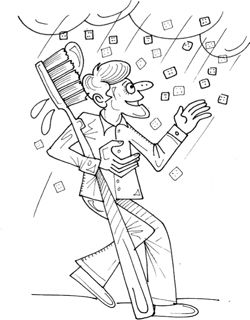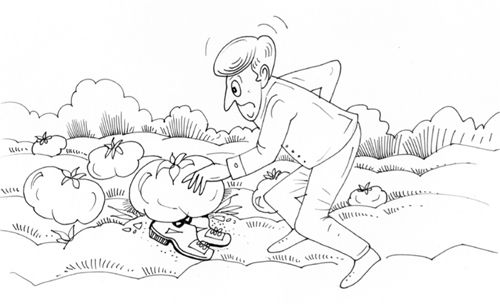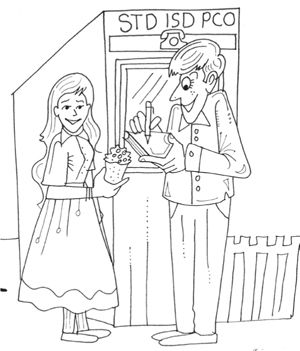How to Memorize Anything (11 page)
Read How to Memorize Anything Online
Authors: Aditi Singhal,Sudhir Singhal
Tags: #Self-Help, #Meditations

Applying any combination of these five principles when forming your images will help make your mental associations truly outstanding and memorable. At first, you may need to consciously apply one or more of the five principles, but after a little practice, their application will become an automatic and natural process.
Try visualizing an association between the following pairs keeping in mind the principle of
AEIOU.
- Banana and Donkey
- Ice-cream and Table
It’s not important how long you visualize a picture,
It’s more important how clear you visualize it.
C
HAPTER AT A GLANCE
- We can memorize any information given in the form of a list or a sequence by forming creative associations using the chain method.
- In this, one object is associated with the second, second with the third and so on, like rings in a chain.
- The items can be linked simply one after the other, like the rings in a chain, or we can weave a story to link all the objects given in the list.
- Points to remember for making strong associations:
- Link only two words at a time.
- First word should be linked to the second, second to the third and so on.
- Do not link one word to many different words as it might create confusion.
- Link only two words at a time.
- Use the principle of AEIOU for better visualization:
- A: All senses—Make associations using all senses.
- E: Exaggerate (think out of proportion) the visualization.
- I: I (myself)—Try including yourself while imagining an association.
- O: Outstanding—The image should be outstanding, i.e. different than usual, silly, not normal.
- U: Use colours and action in your imagination.
- A: All senses—Make associations using all senses.
Using these five principles will enable you to create memorable associations.
5
APPLICATION OF CHAIN METHOD
T
he
‘Chain Method’
is a quick way to connect unrelated items like the ones on a random list or any reading material. The idea is to create effective links between pairs of items in such a way that when you think of one item, the next one immediately comes to mind.
We can create a chain of words in two ways:
- It can be just pure linking where each word is just associated with the next, or
- You can weave a story around the items to make the learning more interesting and permanent.
This method has varied applications. It can be used to memorize a shopping list, grocery list, checklist, things-to-do on a particular day, points of speech or presentation, points to be discussed in a meeting, questions–answers, and many more important things.
MEMORIZING A SHOPPING LIST
We all have a habit of making a list of things to buy from a grocery store, but many a times we forget to carry the list along. Or sometimes we forget to carry the tabs or mobile phones in which we have noted down the list in our car or at home. For people with whom this is a common occurrence, the ‘Chain Method’ is a life saviour using which you can easily memorize all the items in just a few minutes.
Given below is a sample shopping list that includes common items. Your list may vary a little but the method to memorize it will be the same.
Toothbrush
Shampoo
Biscuits
Tomatoes
Reebok sports shoes
Pen
Honey
Mobile recharge
Notebook
Popcorn
Let’s try to remember this list using the chain method:
Just imagine yourself standing outside the shop holding a huge
toothbrush
as tall as you. Now imagine that instead of toothpaste you are putting
shampoo
on it.

As soon as you try to put it in your mouth, it starts raining and instead of raindrops,
biscuits
start pouring from the sky.

To cover yourself you run to a nearby tomato field. There you see bright red
tomatoes
as big as a football. As soon as you pick up the biggest tomato on the field, you find glittering blue
Reebok sports shoes
under it.

As you start trying to wear one of them, a magic
pen
emanating a green light pops out from it. You take that pen and start running but suddenly you fall into a big tub. You realize that it is filled with
honey
. Now imagine yourself totally covered with sticky honey.
You feel dirty and take out your mobile phone from your pocket to call for help. As soon as you try dialling the number, you get a message that there is no balance in your phone. You realize that you were supposed to get your
phone recharged
.

With a lot of difficulty, you manage to come out and reach a phone booth. There you find a
notebook
that has big yellow flowers on its cover. You note down your mother’s number on it and give it to a lady operating the phone booth. You request her to dial this number.
Upon seeing your condition, she offers you some
popcorn
and calls your mother who comes to take you home.

Now after reading the above paragraph, try recalling the list.
I am sure most of you will be able to do it. In case you are not able to visualize the things properly in your mind and are facing difficulty in recalling it, don’t get disheartened. With practice, and by learning other techniques in the coming chapters, I am sure you will be able to improve your visualization and recall.
As I mentioned earlier, each person will have a different list, so you can imagine a chain of events according to your list.
A
S
M
ANY
A
S
Y
OU
W
ANT
You can memorize as long a list as you want; there is no limit to it. You will find no problem doing this, since at one point of time you are making associations between two words only and are visualizing only one image at a time. As we know, the brain has immense potential for remembering images, so it will not get confusing even if you have to memorize a list 50 or 100 words or more. One of our students, made a national record by memorizing 507 words in the same sequence only after listening to them once.
MEMORIZING A LIST OF ‘THINGS -TO-DO’ TODAY
In our day-to-day life, we play so many roles like that of a parent, a son/daughter, a boss, a subordinate, or a friend. While playing those roles we have so many duties and responsibilities to fulfil that it makes our life hectic. One way that we usually follow to plan our day is to make a to-do-list. Now how to remember that?
You might ask why
you should try to remember it
when you can comfortably write it on a piece of paper and later refer to it throughout the day while doing your chores. Well that’s true, but it’s not always possible to refer to your to-do list in-between every task. Also, the chances of misplacing that piece of paper or diary are very high. It makes much more sense to note down your to-do list and then spend a few more minutes to memorize it using
AIR
.
For example, let’s take a list of tasks that you have to do (in sequence) on a particular Saturday.
- Playing
lawn tennis
at your club in the morning - Washing the
car - Going to the
bank
for depositing a cheque - Getting a
hair cut - Buying
medicines - Visiting your
dentist - Visiting a
stationery shop
to buy a few things, like a
hand-made sheet, markers, crayons, and stapler - Picking up a stitched dress from the
boutique - Helping your
son
in completing his school
project - Preparing for your presentation
which is due next week - Baking a
cake
The bold words can be taken as the keywords to be remembered which will further remind you of the complete task to be done. For example, just a mention of the car is enough to remind you that it has to be washed.
Now make associations between the tasks using the chain method. Just to help you out, an idea for the visualization is given below.
VISUALIZATION:
Saturday is the only day when you get to meet your friends in the
club
. Visualize that in the club you are playing
lawn tennis
with your friends. After playing, you and your friends start washing your
car
which is completely covered in mud. You get into your shining, freshly washed car and straight away drive into the
bank
. The people in the bank attack you and start giving you a
haircut
. You fight with them and in the process, you get a cut on your neck. You rush to buy
medicines
from a nearby store. There you see that your
dentist
is
selling medicines. He starts examining your teeth using
stationary items
as his tools. He covers your body with
hand-made paper
, colours your teeth with
crayons
and red
marker
and after that he
staples
your mouth. To remove all these, you rush to your
boutique
where the tailor helps you in removing that paper and gives you your newly stitched dress. You use that dress for your
son’s project
. Your son gets an award for his
presentation
. You celebrate the success by baking a chocolate
cake
.
